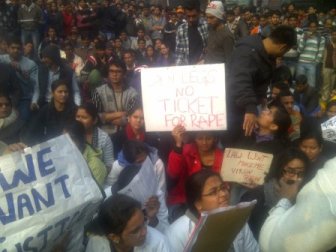 A 23-year-old Indian woman, whose gang-rape aboard a bus in New Delhi spawned days of mass protests across India, has died, according to a doctor who was treating her at a Singapore hospital.
A 23-year-old Indian woman, whose gang-rape aboard a bus in New Delhi spawned days of mass protests across India, has died, according to a doctor who was treating her at a Singapore hospital.
The woman "passed away peacefully" at 4:45 a.m. Saturday (3:45 p.m. ET Friday), with her family and Indian officials at her side, Dr. Kelvin Loh, chief executive officer at Mount Elizabeth Hospital, said in a statement.
The woman had been in "extremely critical condition" since being admitted Thursday to the Singapore hospital, and Loh had said Friday that she'd "taken a turn for the worse."
"She had suffered from severe organ failure following serious injuries to her body and brain," Loh said. "She was courageous in fighting for her life for so long against the odds, but the trauma to her body was too severe for her to overcome."
Authorities haven't released the name of the rape victim, but protesters are calling her Damini, which means "lightning" in Hindi. "Damini" also is a 1993 Bollywood film whose lead female character fights for a housemaid, a victim of sexual assault.
The attackers assaulted the woman and her male companion on a bus December 16, robbing them of their belongings before dumping them at the side of a road, police said. Six suspects are now under arrest, including the bus driver and a minor.
Her male companion was eventually discharged from a hospital, but the female victim's condition deteriorated as she spent days in intensive care, battling for her life.
 Police said Saturday that she had recovered enough to give a statement to a magistrate from her hospital bed the night before. But on Sunday, she underwent another surgery to wash out infection in her abdomen, her doctors said.
Police said Saturday that she had recovered enough to give a statement to a magistrate from her hospital bed the night before. But on Sunday, she underwent another surgery to wash out infection in her abdomen, her doctors said.
The attack set off a wave of protests by those claiming police and government officials do not do enough to address rape in India.
Reported rape cases in India -- where a cultural stigma keeps many victims from reporting the crime -- have increased drastically over the past 40 years -- from 2,487 in 1971 to 24,206 in 2011, according to official figures. New Delhi alone had 572 rapes reported last year and more than 600 in 2012.
One such recent case involved a 17-year-old girl who claimed she'd been gang-raped during the Hindu festival of Diwali on November 13, though a formal case wasn't registered by police until 14 days later.
She committed suicide Wednesday by ingesting poison, according to Paramjit Singh Gill, the inspector-general of police in the Patiala district of Punjab, in northern India. In her suicide note, the teenager blamed her alleged rapists. Three suspects -- including a female accomplice -- have since been arrested, Gill said.
Seema Sirohi, from the Indian Council on Global Relations, said that most women in Indian have stories of sexual harassment and abuse on public transportation, on the streets, and elsewhere. Regardless of how a woman dresses, "You are still open season for men."
"There are a lot of reasons why this happens, but the patriarchal system is one, a lack of policing is another, and general treatment of women is not equal to men, even though it may be so under the law," Sirohi said.
Prime Minister Manmohan Singh has acknowledged the issue, saying that assuring the safety of women is his government's "highest concern." He said their emergence in public "is accompanied by growing threats to their safety and security."
"Women and girls represent half the population, and our society has not been fair to this half," Singh said in a speech Thursday. "Their socio-economic status is improving, but gaps persist."
The Indian government announced plans Thursday to "name and shame" convicted rapists by posting their names, images and addresses on official websites, according to the Times of India.
And the Cabinet plans to set up a commission to look into rape cases and suggest measures to improve women's safety. This group has three months to submit its report to the government.
CNN's Greg Botelho, Harmeet Shah Singh and Hilary Whiteman contributed to this report.
Portland and Seattle
Free Subscription to Breaking News
Free Subscription to Breaking News























































































































































































































































































































































